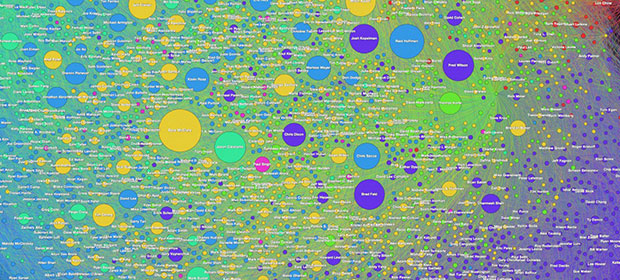- Seven Microservices Anti-Patterns — One common mistake people made with SOA was misunderstanding how to achieve the reusability of services. Teams mostly focused on technical cohesion rather than functional regarding reusability. For example, several services functioned as a data access layer (ORM) to expose tables as services; they thought it would be highly reusable. This created an artificial physical layer managed by a horizontal team, which caused delivery dependency. Any service created should be highly autonomous – meaning independent of each other.
- CSCI 4974 / 6974 Hardware Reverse Engineering — RPI CS course in reverse engineering.
- The Gremlin Graph Traversal Language (Slideshare) — preso on a language for navigating graph data structures, which is part of the Apache TinkerPop (“Open Source Graph Computing”) suite.
- Why Are There Still So Many Jobs? The History and Future of Workplace Automation (PDF) — paper about the history of technology and labour. The issue is not that middle-class workers are doomed by automation and technology, but instead that human capital investment must be at the heart of any long-term strategy for producing skills that are complemented by rather than substituted for by technological change. Found via Scott Santens’s comprehensive rebuttal.
"Next:Economy" entries


Four short links: 25 August 2015
Microservices Anti-Patterns, Reverse Engineering Course, Graph Language, and Automation Research


Four short links: 19 August 2015
Privacy-Respecting Algorithms, Dealers Growing, Book Recommendations, and End of Internet Dreams
- Efficient Algorithms for Public-Private Social Networks — Google Research paper on privacy-respecting algorithms for social networks. From the overview: the models of privacy we’re landing on (nodes or edges in the graph are marked as “private” by a user) mean that enforcing these privacy guarantees translates to solving a different algorithmic problem for each user in the network, and for this reason, developing algorithms that process these social graphs and respect these privacy guarantees can become computationally expensive. The paper shows how to efficiently approximate some of the graph operations required to run a social network.
- Rise of Networked Platforms for Physical World Services (Tim O’Reilly) — the central player begins by feeding its network of suppliers, but eventually begins to compete with it. […] Over time, as networks reach monopoly or near-monopoly status, they must wrestle with the issue of how to create more value than they capture — how much value to take out of the ecosystem, versus how much they must leave for other players in order for the marketplace to continue to thrive.
- Book Recommendations from BLDBLOG — Winslow memorably pointed out how farmers in the Sinaloa region of Mexico had been swept up into the cartel’s infinitely flexible method of production, and that, despite any ensuing role growing and harvesting marijuana or even poppies, the cartel offered them new jobs in logistics, not agriculture. “They didn’t want to be farmers,” Winslow said at Bookcourt, “they wanted to be FedEx.”
- The End of the Internet Dream (Jennifer Granick) — this is all gold. Something resonating with my current meditations: People are sick and tired of crappy software. And they aren’t going to take it any more. The proliferation of networked devices — the Internet of Things — is going to mean all kinds of manufacturers traditionally subject to products liability are also software purveyors. If an autonomous car crashes, or a networked toaster catches on fire, you can bet there is going to be product liability. […] I think software liability is inevitable. I think it’s necessary. I think it will make coding more expensive, and more conservative. I think we’ll do a crappy job of it for a really long time.

The rise of networked platforms for physical world services
A look at the huge economic shift led by software and connectedness.

Request an invitation to Next:Economy, our event aiming to shed light on the transformation in the nature of work now being driven by algorithms, big data, robotics, and the on-demand economy.
One of the themes we’re exploring at the Next:Economy summit is the way that networks trump traditional forms of corporate organization, and how they are changing traditional ways of managing that organization. Uber and Airbnb are textbook examples of this trend. Uber has ambitious plans to manage hundreds of thousands — eventually even millions — of independent drivers with a small core of employees building a technology platform that manages those workers. Airbnb is on track to have more rooms on offer than large hotel chains, with under a thousand employees.
Esko Kilpi beautifully described the power of networks in an essay on Medium, The Future of Firms, reflecting on economist Ronald Coase’s theory of 20th century business organization. He wrote:
The existence of high transaction costs outside firms led to the emergence of the firm as we know it, and management as we know it. … The reverse side of Coase’s argument is as important: if the (transaction) costs of exchanging value in the society at large go down drastically, as is happening today, the form and logic of economic and organizational entities necessarily need to change! The core firm should now be small and agile, with a large network.
The mainstream firm, as we have known it, becomes the more expensive alternative. This is something that Ronald Coase did not see coming. Accordingly, a very different kind of management is needed when coordination can be performed without intermediaries with the help of new technologies. Apps can do now what managers used to do.[Bolding mine.]
Today, we stand on the threshold of an economy where the familiar economic entities are becoming increasingly irrelevant. The Internet and new Internet-based firms, rather than the traditional organizations, are becoming the most efficient means to create and exchange value.


Four short links: 14 August 2015
Jeep Hack, Blockchain for Beginners, Three Next:Economy Papers, and Signs of Self-Destruction
- The Jeep Cherokee Hack (Kaspersky) — details from the Black Hat talk.
- The Complete Beginner’s Guide to Blockchain Technology — in case you’ve been slipping on your nerd cred.
- Automation Angst (The Economist) — discusses three papers: (1) automation creates new jobs; (2) the sweet-spot of automation has been in mid-range intellectual, mid-rate physical tasks; and (3) know the history of automation/unemployment scares.
- Observational Signatures of Self-Destructive Civilisations (arXiv) — Using the Earth as an example, we consider a variety of scenarios in which humans could extinguish their own technological civilisation. Each scenario presents some form of observable signature that could be probed by astronomical campaigns to detect and characterise extrasolar planetary systems. I feel like there’s a business form of this paper, too …


Four short links: 12 August 2015
Economic Futures, Space War, State of Security, and Algorithmic Fairness
- Possible Economics Models (Jamais Cascio) — economic futures filtered through Doctorovian prose. Griefer Economics: Information is power, especially when it comes to finance, and the increasing use of ultra-fast computers to manipulate markets (and drive out “weaker” competitors) is moving us into a world where market position isn’t determined by having the best offering, but by having the best tool. Rules are gamed, opponents are beaten before they even know they’re playing, and it all feels very much like living on a PvP online game server where the referees have all gone home. Relevant to Next:Economy.
- War in Space May Be Closer Than Ever (SciAm) — Today, the situation is much more complicated. Low- and high-Earth orbits have become hotbeds of scientific and commercial activity, filled with hundreds upon hundreds of satellites from about 60 different nations. Despite their largely peaceful purposes, each and every satellite is at risk, in part because not all members of the growing club of military space powers are willing to play by the same rules — and they don’t have to, because the rules remain as yet unwritten. There’s going to be a bitchin’ S-1 risks section when Planet Labs files for IPO.
- Not Even Close: The State of Computer Security (Vimeo) — In this bleak, relentlessly morbid talk, James Mickens will describe why making computers secure is an intrinsically impossible task. He will explain why no programming language makes it easy to write secure code. He will then discuss why cloud computing is a black hole for privacy, and only useful for people who want to fill your machine with ads, viruses, or viruses that masquerade as ads. At this point in the talk, an audience member may suggest that bitcoins can make things better. Mickens will laugh at this audience member and then explain why trusting the bitcoin infrastructure is like asking Dracula to become a vegan. Mickens will conclude by describing why true love is a joke and why we are all destined to die alone and tormented. The first ten attendees will get balloon animals, and/or an unconvincing explanation about why Mickens intended to (but did not) bring balloon animals. Mickens will then flee on horseback while shouting “The Prince of Lies escapes again!”
- Algorithms and Bias (NYTimes) — interview w/Cynthia Dwork from Microsoft Research. Fairness means that similar people are treated similarly. A true understanding of who should be considered similar for a particular classification task requires knowledge of sensitive attributes, and removing those attributes from consideration can introduce unfairness and harm utility.

The WTF economy is transforming how we do business
Our Next:Economy event aims to inspire industry leaders to rebuild the economy by solving the hard problems.
Request an invitation to Next:Economy, our event aiming to shed light on the transformation in the nature of work now being driven by algorithms, big data, robotics, and the on-demand economy.
WTF?! In San Francisco, Uber has 3x the revenue of the entire prior taxi and limousine industry.
WTF?! Without owning a single room, Airbnb has more rooms on offer than some of the largest hotel groups in the world. Airbnb has 800 employees, while Hilton has 152,000.
WTF?! Top Kickstarters raise tens of millions of dollars from tens of thousands of individual backers, amounts of capital that once required top-tier investment firms.
WTF?! What happens to all those Uber drivers when the cars start driving themselves? AIs are flying planes, driving cars, advising doctors on the best treatments, writing sports and financial news, and telling us all, in real time, the fastest way to get to work. They are also telling human workers when to show up and when to go home, based on real-time measurement of demand.The algorithm is the new shift boss.
WTF?! A fabled union organizer gives up on collective bargaining and instead teams up with a successful high tech entrepreneur and investor togo straight to the people with a local $15 minimum wage initiative that is soon copied around the country, outflanking a gridlocked political establishment in Washington.
What do on-demand services, AI, and the $15 minimum wage movement have in common? They are telling us, loud and clear, that we’re in for massive changes in work, business, and the economy.
